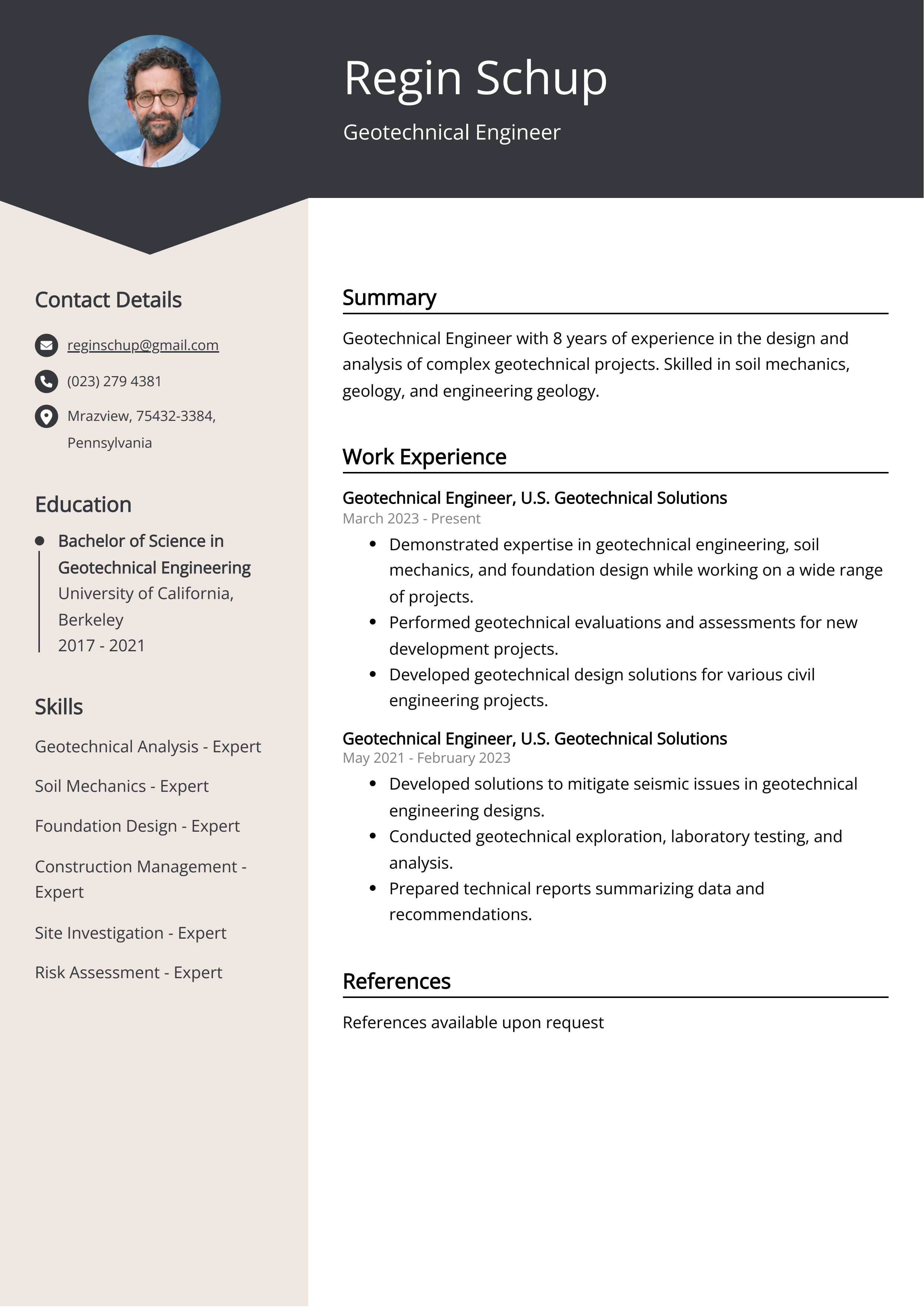The Buzz on Geotheta
The Buzz on Geotheta
Blog Article
The Best Guide To Geotheta
Table of ContentsWhat Does Geotheta Do?Getting The Geotheta To WorkThe smart Trick of Geotheta That Nobody is DiscussingExcitement About GeothetaThe smart Trick of Geotheta That Nobody is Discussing

They perform website investigations, gather samples, perform laboratory tests, and examine data to review the viability of the ground for building jobs - Geo Tech Engineering. Based on their findings, geotechnical designers supply suggestions for foundation layout, incline stability, keeping frameworks, and reduction of geotechnical hazards. They collaborate with various other experts, such as engineers, structural engineers, and building groups, to make sure that geotechnical factors to consider are integrated into the general task style and implementation
By assessing the habits and properties of soil and rock, they can recognize possible geotechnical threats such as landslides, dirt negotiation, or slope instability. Their experience assists protect against failings or mishaps that can threaten lives and home. Below are some in-depth obligations and obligations of a geotechnical designer: Site Investigation: Geotechnical designers conduct website examinations to collect information on subsurface problems.
They interpret the information to recognize the residential properties and behavior of the dirt and rock, including their stamina, leaks in the structure, compaction qualities, and groundwater problems. Geotechnical Analysis and Layout: Geotechnical engineers evaluate the information accumulated throughout site examinations to evaluate the stability and suitability of the website for construction jobs. They execute geotechnical estimations and modeling to review variables such as bearing capacity, settlement, incline security, lateral planet pressures, and groundwater flow.
An Unbiased View of Geotheta
Foundation Style: Geotechnical designers play a critical role in developing foundations that can safely support the designated structure. They analyze the soil problems and tons needs to establish the appropriate foundation type, such as shallow structures (e.g., footings), deep foundations (e.g (https://pxhere.com/en/photographer/4325446)., piles), or specialized techniques like soil improvement. They take into consideration variables such as settlement limits, bearing capability, and soil-structure interaction to create optimum foundation layouts
They review building and construction plans, screen site tasks, and carry out area evaluations to confirm that the layout recommendations are adhered to. If unanticipated geotechnical problems arise, they analyze the circumstance and supply recommendations for removal or adjustments to the layout. Risk Analysis and Mitigation: Geotechnical engineers assess geotechnical dangers and risks connected with the project site, such as landslides, liquefaction, or soil disintegration.

Collaboration and Interaction: Geotechnical engineers function closely with various other experts associated with a task, such as architects, architectural engineers, and construction groups. Effective interaction and collaboration are vital to integrate geotechnical factors to consider into the general project style and building process. Geotechnical engineers offer technological expertise, solution queries, and make sure that geotechnical demands are fulfilled.
Things about Geotheta
Here are some kinds of geotechnical designers: Foundation Designer: Structure engineers focus on designing and evaluating foundations for structures. They analyze the dirt problems, lots requirements, and site features to determine the most appropriate foundation kind and design, such as shallow structures, deep structures, or specialized strategies like heap structures.
They review the variables affecting incline security, such as dirt residential properties, groundwater problems, and slope geometry, and establish strategies to stop slope failures and alleviate dangers. Earthquake Engineer: Earthquake engineers specialize in my blog assessing and creating structures to hold up against seismic pressures. They assess the seismic threat of a website, examine soil liquefaction potential, and develop seismic layout criteria to ensure the safety and durability of structures throughout quakes.
They do field testing, gather samples, and assess the collected information to characterize the dirt residential or commercial properties, geologic formations, and groundwater problems at a site. Geotechnical Instrumentation Designer: Geotechnical instrumentation engineers concentrate on surveillance and measuring the actions of soil, rock, and structures. They mount and keep instrumentation systems that keep track of aspects such as soil negotiation, groundwater levels, incline activities, and structural displacements to analyze efficiency and offer very early cautions of prospective concerns.
More About Geotheta
They conduct examinations such as triaxial examinations, loan consolidation tests, direct shear tests, and permeability tests to gather data for geotechnical evaluation and style. Geosynthetics Designer: Geosynthetics designers specialize in the layout and application of geosynthetic materials, such as geotextiles, geogrids, and geomembranes. They utilize these materials to improve soil security, strengthen inclines, supply water drainage services, and control disintegration.
They have a tendency to be investigatory people, which indicates they're intellectual, introspective, and analytical. They are curious, methodical, logical, logical, and logical. A few of them are additionally social, indicating they're kind, charitable, participating, person, caring, handy, empathetic, tactful, and friendly. Does this sound like you? Take our complimentary job examination to learn if geotechnical engineer is one of your top job matches.
In the office atmosphere, geotechnical engineers use specialized software program tools to execute computations, produce designs, and examine data. They prepare reports, review project requirements, connect with customers and staff member, and coordinate task tasks. The office setup gives a favorable atmosphere for research, evaluation, and collaboration with various other experts included in the job.
Some Known Factual Statements About Geotheta
They frequently check out project websites to conduct website examinations, assess geotechnical problems, and collect information for evaluation. These brows through include traveling to various locations, occasionally in remote or difficult terrains. Geotechnical engineers may execute soil tasting, conduct examinations, and monitor building and construction tasks to make sure that the geotechnical facets of the project are being carried out appropriately.
Geotechnical designers likewise function in specialized geotechnical laboratories. Geotechnical lab engineers function thoroughly in these atmospheres, taking care of testing devices, operating tools, and taping data.
Report this page